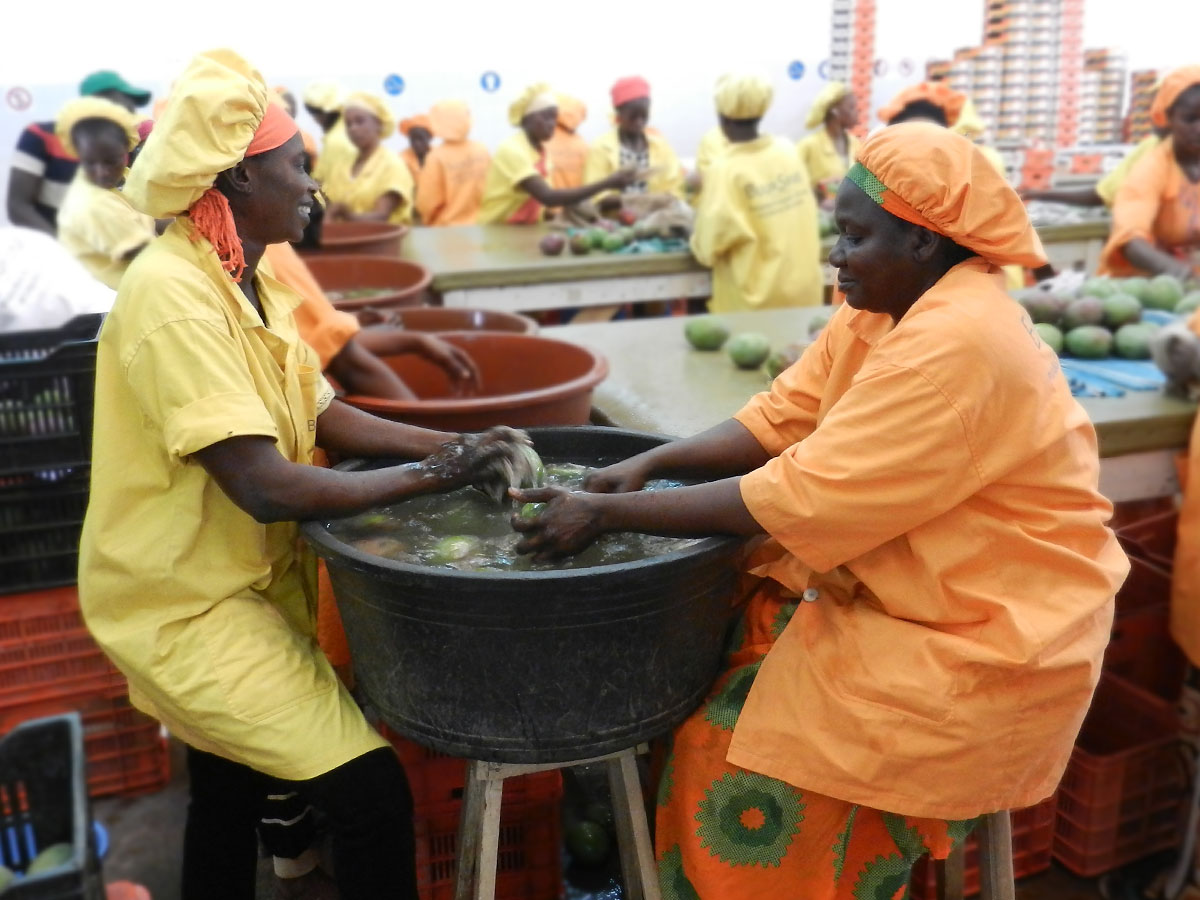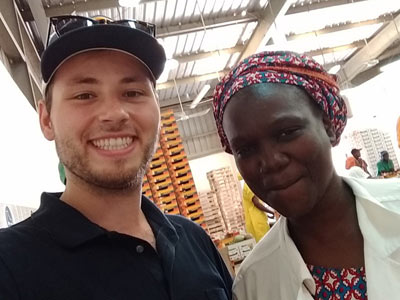Mangos from Senegal: From harvest to export crate

ORIGIN Senegal | START 2009 | PROJECT PARTNER Buur Sine, cooperative with business partner Amacodou Diouf | MEMBERS 75 | CULTIVATION AREA 125 ha | CERTIFICATION Bio Suisse, EU organic, GLOBALG.A.P., Naturland | PRODUCTS Mangoes, local trade with cashews and lime
Our buyer, David Buitenhuis recently visited Senegal for the first time. There he visited the Buur Sine Cooperative, which supplies its organic mangoes to BioTropic. The harvest season for the popular fruit started in July and David had the opportunity to observe the value creation process in the country from harvest to consignment.
Amacodou Diouf, Buur Sine's Managing Director met David at the airport. They drove to the packing station, which is located not far from Dakar. There he was able to observe how freshly harvested mango fruits have been unloaded. "The mangoes are delivered to the packing station fresh from the field on the very day they are harvested, to be prepared there for export. This is excellent and has not been common practice everywhere," states David.
The next day they went together to visit two of the cooperative's mango plantations. There is a point at which the road is no longer under tarmac, the journey becomes an adventure and leads across country through sandy expanses. The mango trees grow in the lowlands of Niayes, a relatively vast wetland in an otherwise dry Senegal. To prevent erosion the fields are surrounded by hedges. The trees stand scattered hither and thither across a surprisingly barren landscape. "I had really expected more greenery. Currently, however there is drought, regular rainfall does not begin again until mid-August," acknowledges David. However, mango trees are undemanding. Their long tap roots dig deep into the earth.
How are mangoes harvested?
The fruits are harvested with a knife blade on a long stick. Immediately after picking the long stems on the fruit are cut off. The harvesters are accustomed to avoiding contact with the sticky, slightly caustic juice, which pours abundantly from the cut edge. They skilfully place the fruit with the cut edge downwards on the ground, so that the fruit cannot become sticky or damaged.
The smallholders grow the Kent variety exclusively for the foreign trade. The medium-sized fruits are low-fibre and very aromatic. "In comparison with mangoes from other provenance Senegalese mangoes have a relatively short transport route from tree to Duisburg. This means that they retain their intense aroma," explains David.
In the packing station
The mangoes collected are then driven to the packing station, where they are washed, sorted and packed. "We have a total of 120 seasonal employees and 75 mango farmers supply their products," says Amacodou Diouf as he shows David round. During the harvest season many students work for Buur Sine, in order to make a little money during the vacation. During his tour of the packing station David makes the acquaintance of Fatou, who is studying law. Conversely, Fallou is primarily responsible for quality assurance during the harvest. And there is Tschurro, who sees that everything is as it should be in the packing station and who checks the quality and ensures the traceability of the fruit.
At midday everyone stops for lunch. Buur Sine provides a meal cooked fresh each day for the employees. Lunch consists mostly of rice with a sauce, vegetables, chicken and spices. Traditionally everyone eats from a large flat dish, each person serving himself or herself with a spoon.
Independently of David an inspector from an international monitoring service was also visiting Buur Sine to conduct a GRASP audit. This is an additional module of GLOBALG.A.P., which appraises social management in agriculture and concerns itself with safety at work, health protection and the workers' social issues. Certification is voluntary.
David Buitenhuis:
"Direct contact with suppliers is irreplaceable. It is the only way, in which you can find out how much work and commitment lie hidden behind the product supplied. Diouf and his employees make huge efforts to satisfy European standards and Buur Sine also takes good care of its employees. For example, a hot meal at midday is not the norm for every Senegalese. Buur Sine provides the people on site with a good livelihood and creates perspectives. We are delighted to have a supplier like this as our partner!"
Text: Visnja Malesic, David Buitenhuis
Images: BioTropic GmbH
Status: July 2019






